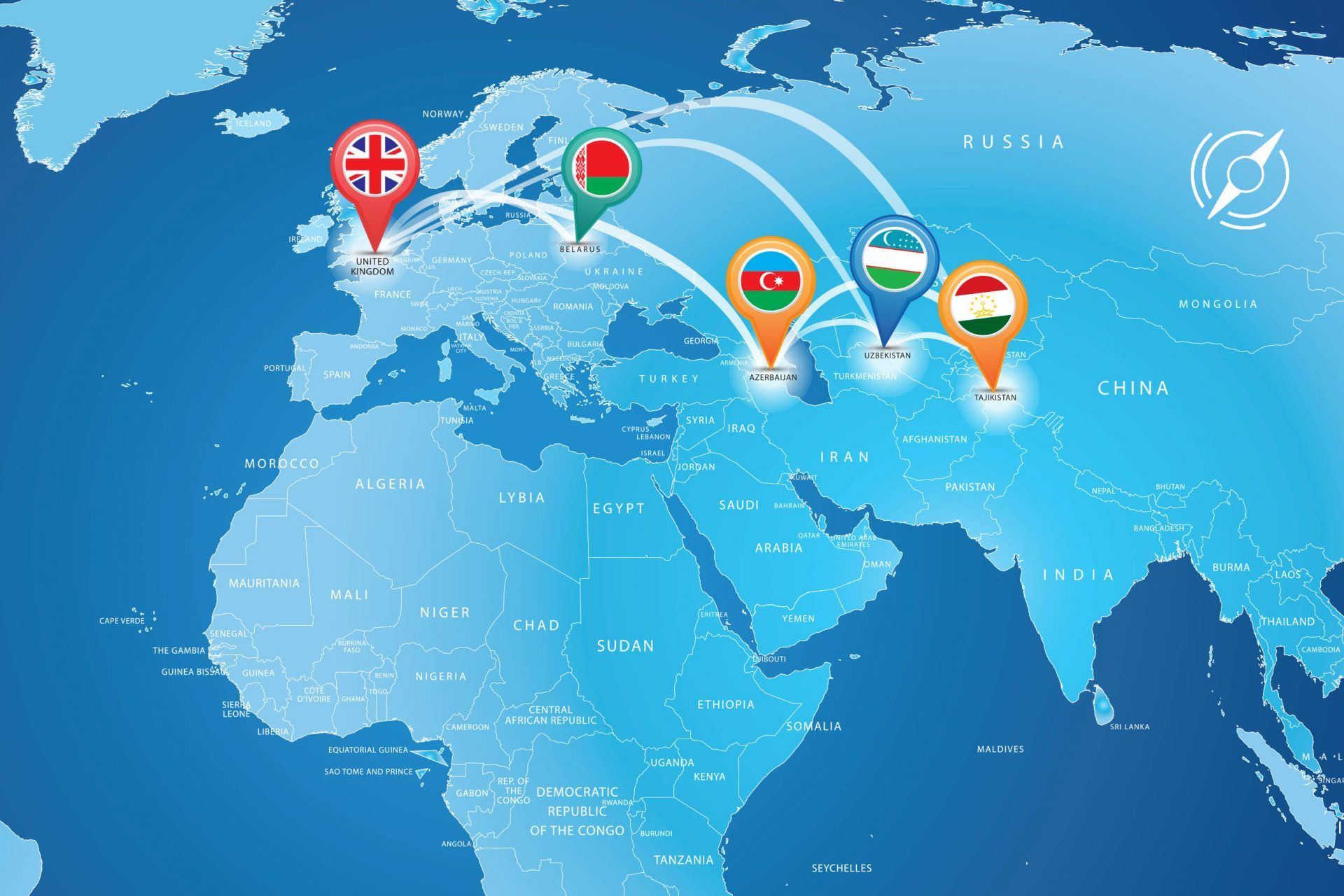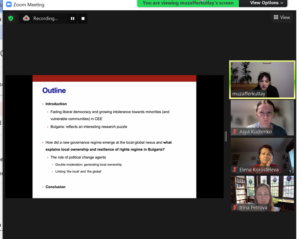COMPASS Work in Progress Seminars 2022
The schedule for the 2022 Spring Term at the University of Kent is available here.
The schedule for the Lent Term 2022 at the University of Cambridge is available here.
OST Research Centre, Oxford Belarus Observatory (OBO) and GCRF COMPASS online discussions 2022
The Research Centre of Sviatlana Tsikhanouskaya Office (OST Research Centre) and the Oxford Belarus Observatory (OBO), from the Oxford School of Global and Area Studies, with the support of the GCRF COMPASS project, announce a series of jointly convened expert online (zoom) webinars which will be conducted weekly from January – March 2022, 15.00 (UK time) / 17.00 (Vilnius time).
See the schedule here.
Next event – Thursday 10th March:
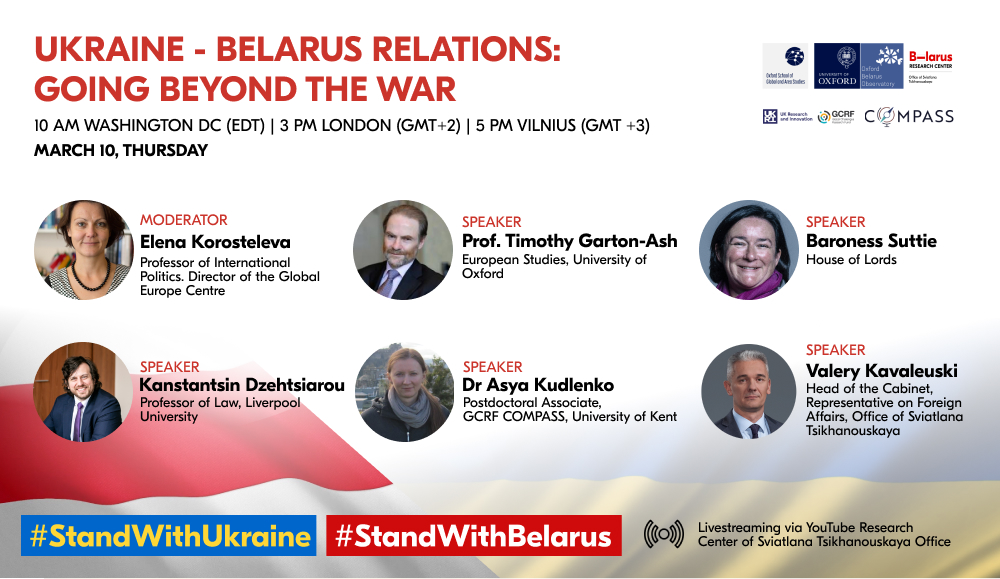
Recordings of the events and live streaming can be found here.
January 20, 2022. Protests in Kazakhstan and the involvement of the CSTO: security implications for Belarus and the wider neighbourhood. Announcement here.
January 27, 2022. Belarus’ integration with Russia: assessing the challenges for the country. Announcement here.
February 3, 2022. Sanctions for and Counter-sanctions by Belarus: what is the game-changer? Announcement here.
February 10, 2022. Olaf Scholz replaces Angela Merkel: what does this mean for the Kremlin and official Minsk? Announcement here.
February 17, 2020. Nuclear-free Belarus: is it in danger? Announcement here
February 24, 2022. Referendum in Belarus: what does it mean for Democratic Forces and Government? Announcement here
30 March – ‘The Eurasian Economic Union (EAEU) as an Order-Making Actor (OMA)’ – Mr Huawei Zheng
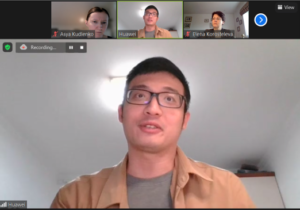 On 30 March 2022, the University of Kent team hosted the last WiPS of the project with Mr Huawei Zheng, a PhD candidate at the School of Politics and International Relations. His presentation summarised the core argument of his PhD thesis and the content of each chapter. Against the decentralising transformation that international order is undergoing, Mr Zheng’s thesis introduces a novel idea of order-making actors (OMAs). It explores the extent to which the Eurasian Economic Union (EAEU) is such an OMA that can shape the international environment as it sees fit. The thesis arrives at the conclusion that the EAEU is committed to a socioeconomic-focused, locally based, and people-friendly regional order. Although this thesis is essentially a case study, it has wider significance that may shed light on other OMAs observable in the international arena. Small and regional OMAs can contribute to the changing international order in a progressive and bottom-up way.
On 30 March 2022, the University of Kent team hosted the last WiPS of the project with Mr Huawei Zheng, a PhD candidate at the School of Politics and International Relations. His presentation summarised the core argument of his PhD thesis and the content of each chapter. Against the decentralising transformation that international order is undergoing, Mr Zheng’s thesis introduces a novel idea of order-making actors (OMAs). It explores the extent to which the Eurasian Economic Union (EAEU) is such an OMA that can shape the international environment as it sees fit. The thesis arrives at the conclusion that the EAEU is committed to a socioeconomic-focused, locally based, and people-friendly regional order. Although this thesis is essentially a case study, it has wider significance that may shed light on other OMAs observable in the international arena. Small and regional OMAs can contribute to the changing international order in a progressive and bottom-up way.
16 March – “Routines and Routinization in World Politics” – Dr Filip Ejdus
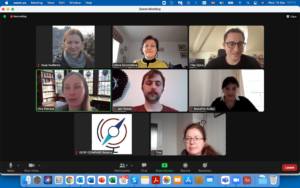 On 16 March 2022, the University of Kent team hosted a WiPS discussion with Dr Filip Ejdus (Faculty of Political Science, University of Belgrade). Dr Ejdus spoke about the concept of routines in IR. Despite the recent interest in the “practice turn” and the “logic of habit” in world politics, routines have been either ignored altogether or used interchangeably with practices and habits. Even in ontological security studies, where the stability of routines is part and parcel of the core theoretical argument, the conceptualization of routines has been rather thin. The paper presented aimed to fill this gap. By drawing on insights from organizational and behavioural sciences and with illustrations from world politics, it posited that routines are a phenomenon close but analytically distinct from both practices and habits. In a nutshell, it argued that routines, as recurring but dynamic patterns of action or discourse, provide stability, reduce uncertainty, sustain identities, allow coordination, improve efficiency and foster learning. As such, they stand between practices, a more general term denoting socially meaningful and competent patterns of action that embody tacit knowledge, and more narrow habits, or automatic and unreflective responses triggered by a cue.
On 16 March 2022, the University of Kent team hosted a WiPS discussion with Dr Filip Ejdus (Faculty of Political Science, University of Belgrade). Dr Ejdus spoke about the concept of routines in IR. Despite the recent interest in the “practice turn” and the “logic of habit” in world politics, routines have been either ignored altogether or used interchangeably with practices and habits. Even in ontological security studies, where the stability of routines is part and parcel of the core theoretical argument, the conceptualization of routines has been rather thin. The paper presented aimed to fill this gap. By drawing on insights from organizational and behavioural sciences and with illustrations from world politics, it posited that routines are a phenomenon close but analytically distinct from both practices and habits. In a nutshell, it argued that routines, as recurring but dynamic patterns of action or discourse, provide stability, reduce uncertainty, sustain identities, allow coordination, improve efficiency and foster learning. As such, they stand between practices, a more general term denoting socially meaningful and competent patterns of action that embody tacit knowledge, and more narrow habits, or automatic and unreflective responses triggered by a cue.
2 February – “Where is Eastern Europe in ‘Global IR’?” – Dr Maria Mälksoo
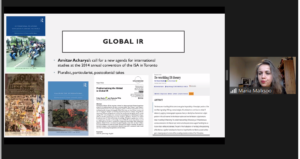
On 2 February 2022, the University of Kent team hosted a WiPS discussion with Dr Maria Mälksoo (Centre for Military Studies, Department of Political Science, University of Copenhagen). Dr Mälksoo spoke about the role and place of Central and Eastern Europe (CEE) in Global International Relations (IR). CEE as a possible point of departure for ‘de-parochializing’ IR has not been systematically investigated up until the recent special issue of the Journal of International Relations and Development (‘Uses of the East in International Studies’, vol. 24, no. 4, Dec 2021). In her talk, Dr Mälksoo asked some important question linked to this, including: What explains the relative silence of the CEE in the ‘global IR’ thus far? In which ways can the IR scholarship from CEE still be considered ‘peripheral knowledge’? and What could be the de-centering potential of the regional IR scholarship for the discipline? She also discussed some of the structural reasons for the underrepresentation of the scholarship from CEE universities in the leading IR journals, along with the equally modest percentage of the regionally affiliated scholars in the editorial boards of influential IR journals and in prestigious grant capture.
19 January – ‘‘International friendship as a relationship in the future’ – Dr Felix Berenskoetter
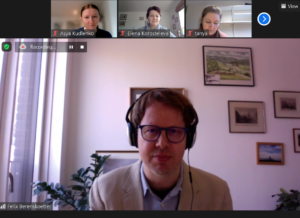
On 19 January 2022, the University of Kent team hosted a WiPS discussion with Dr Felix Berenskoetter (SOAS University of London). He spoke about his research on friendship in International Relations. The talk explored what role the future plays in the construction, maintenance and breakdown of (international) friendship. Based on (a) the ontological reading of the subject as temporal, and (b) the central role of trust in friendship, it put forward the argument that shared visions of the future are a crucial element of a friendship bond. Dr Berenskoetter unpacked this angle and its implications for our understanding of how friendships between political units/collectives, such as states, are formed and how they enter crisis. He has also showed how this ontology reveals the political nature of friendship, and how the power dynamics involved in negotiating and investing in a shared vision directs attention to the politics of (international) friendship.
COMPASS Work in Progress Seminars 2021 – 2022
The schedule for the Autumn and Spring Terms 2021-2022 at the University of Kent is available here.
The schedule for the Michaelmas Term 2021 at the University of Cambridge is available here.
COMPASS-Oxford OBO Webinar Series 2021
The schedule for the Autumn Term 2021 for webinars, organised with Oxford Belarus Observatory (OBO), is available here.
16 December 2021 – ‘The role of change agents in building local ownership: What explains the resilience of minority rights regime in Bulgaria?’ – Dr Muzaffer Kutlay
On 16 December 2021, Dr Muzaffer Kutlay from the GCRF COMPASS University of Kent team presented her current research at WiPS. The presentation focused on the governance of minority rights regime in Bulgaria. Since the country’s independence from the Ottoman Empire, the minority rights policies have been markedly controversial. As an indigenous community and the largest minority population, Turks have often been seen as a destabilising factor. In the 1980s, the anti-Turkish sentiment culminated in a state-led systematic assimilation policy in the winter of 1984-85, notoriously called the “national revival process.” It is reported that 345,960 people were forced to migrate to Turkey in the summer of 1989. After the collapse of the Bulgarian Communist regime, almost 40 per cent (according to registered numbers, 133,272) voluntarily returned to Bulgaria throughout the 1990s. Despite difficult background conditions, the post-1990s developments marked a significant improvement in minority governance. A new governance regime was built around a new sense of collective identity and common vision for a more inclusive political community — supported by strong local ownership of the new (more inclusive) rights regime. As a result, most of the political and social rights of the Turkish minority were restored. With the help of the complexity thinking, Dr Kutlay looked into how this regime emerged and what made it resilient.
24 November 2021 – ‘Resilience awareness among hamsoya in time of the “absurd”: Philosophical reflections on Afghani-stan and -stans around’ – Dr Nargis Nurulla–Khodzhaeva
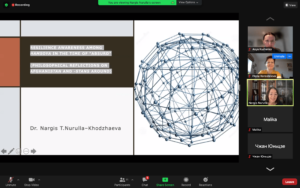
On 24 November 2021, the University of Kent team hosted a WiPS discussion with Dr Nargis Nurulla–Khodzhaeva (Lomonosov Moscow State University, Russia). The discussion focused on the growing perceptivity of “absurd” of the (post-)pandemic time by revisiting ideas from Sufi (Ibn Arabi, Al Ghazali, Rumi) and modern philosophy (Derrida and Foucault).
The talk was developed through an imaginary dialogue of virtual neighbours or hamsoya (ham – together, soya – shadow, or literally, it is “those with whom we share shadow”). The concept is present in Tajiki (Tajikistan), as well as in many other languages around (including Afghanistan).
Having invited the audience to be her hamsoya, Dr Nargis Nurulla–Khodzhaeva looked at the current regimes of Central Asian -stans in the subtext of “hierarchical dualism” and erosion of hamsoya values.
3 November 2021 – ‘Entangled Peace and its Limits’ – Dr Ignasi Torrent
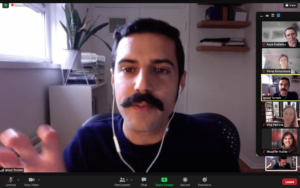
On 3 November 2021, the University of Kent team hosted a WiPS webinar with Dr Ignasi Torrent (University of Hertfordshire, UK). The presentation discussed the suitability of entanglements and relations as a mode of thinking and seeing peacebuilding events. Triggered by a reflection upon the UN’s limited results in the endeavour towards securing lasting peace in war-torn scenarios, Dr Torrent critically engaged with three debates in contemporary peacebuilding literature, including the inclusion of ‘the locals’, the achievement of organisational system-wide coherence and the increasingly questioned agential condition of peacebuilding actors. He suggested that the UN, inattentive to the relational vulnerability of involved stakeholders, seeks to secure a totalising modern ‘distory’, defined as a story that undoes other stories. Whilst affirming the entangled ontogenesis of actors and processes in the conflict-affected configuration, Torrent also made a cautionary argument about the limits of what he described as entanglement fetishism, namely the celebratory, normative, deterministic and exclusionary projection of a relational world. Ultimately, entangled peace is an invitation to speculate over the peacebuilding milieu, and by extension the broader theatre of the real, as radical openness, in which events emanate from the collision of an infinite multiplicity of possible worlds.
28 October 2021 – ‘Contesting the International through the Local: Unpacking Turkey’s Contestation of the EU and the Liberal International Order’ – Professor Senem Aydın-Düzgit
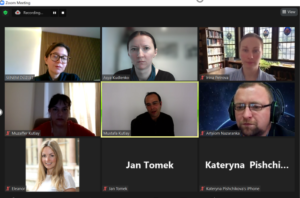
On 28 October 2021, the University of Kent team hosted a WiPS webinar with Prof. Senem Aydın-Düzgit (Sabanci University and Istanbul Policy Center, Turkey). In the presentation, she discussed her current work on Turkey’s contestation of the EU and the Liberal International Order. Prof. Senem Aydın-Düzgit offered a comprehensive analysis of the ways in which Turkey contests the EU’s claims to the liberal international order and the constituent elements of this order in two related steps. First, she identified the arguments put forward by Turkey’s President Erdoğan where he engages in a direct contestation of the EU from the conceptual viewpoint of three understandings of global justice and the international order. Secondly, from the same analytical lens, she focused on the justifications through which he contested the current international order, with a view to observe the parallels and contradictions between the two types of contestation.
The paper argued that Turkey undertakes a largely normative contestation of the EU in its wider neighbourhood, which oftentimes contradicts its own state-centric perspectives of the international order. Yet, despite the contradictions in its approach, the EU’s own internal shortcomings or its colonial past which it does not sufficiently engage with, enable Turkey to undertake such contestation which aims to delegitimise EU’s actorness in its wider neighbourhood.
13 October 2021 – ‘The role of ‘the Local’ in the Age of Complexity: Reconceptualising Local Ownership in the EU Foreign Policy’ – Professor Elena Korosteleva and Dr Irina Petrova
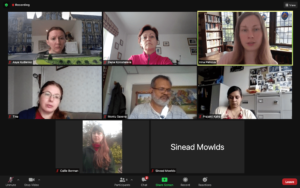 On 13 October 2021 GCRF COMPASS hosted WiPS webinar with Professor Elena Korosteleva (University of Kent) and Dr Irina Petrova (UCL and University of Kent). The discussion focused on the role of the local and local ownership in the EU Foreign Policy. The speakers argued that in the context of ongoing deep transformations of the international system and the ultimately limited effectiveness of existing policy tools, the EU needed to profoundly rethink its modes of engagement and integration with a wider Europe and Eurasia. Using complexity theory as the main framework, they posited that in the VUCA world — the world of increasing volatility, uncertainty, complexity and ambiguity – it was at level of the local that the most effective problem-solving was possible, while pre-defined ‘global’ policy templates were proving ineffective and even futile.
On 13 October 2021 GCRF COMPASS hosted WiPS webinar with Professor Elena Korosteleva (University of Kent) and Dr Irina Petrova (UCL and University of Kent). The discussion focused on the role of the local and local ownership in the EU Foreign Policy. The speakers argued that in the context of ongoing deep transformations of the international system and the ultimately limited effectiveness of existing policy tools, the EU needed to profoundly rethink its modes of engagement and integration with a wider Europe and Eurasia. Using complexity theory as the main framework, they posited that in the VUCA world — the world of increasing volatility, uncertainty, complexity and ambiguity – it was at level of the local that the most effective problem-solving was possible, while pre-defined ‘global’ policy templates were proving ineffective and even futile.
By putting the principle of local ownership at the heart of EU cooperation externally, Professor Korosteleva and Dr Petrova argued that the EU could reformat its relations with the neighbourhood, and beyond, in more effective and sustainable ways. They also emphasised that to achieve this, it is essential, to re-relate ‘the local’ and re-conceptualise ‘local ownership’, by viewing it through the lens of complexity-thinking as part of an emergent, non-linear, processual, relational, and unpredictable world.
COMPASS Work in Progress Seminars 2020 – 2021
The schedule for the Summer term 2020-2021 at the University of Kent is available here.
The schedule for the Easter term 2020-2021 at the University of Cambridge is available here. Video of the presentations can be accessed here.
25 June 2021 – ‘Preventing governance breakdown in the EU’s neighbourhood: Fostering resilience to strengthen security perceptions’– Dr Eric Stollenwerk
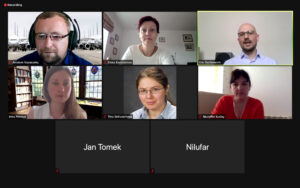 On 25 June 2021 the University of Kent team hosted WiPS webinar with Dr Eric Stollenwerk (German Institute for Global and Area Studies (GIGA) in Hamburg, Germany). The presentation focused on the European Union’s southern neighbourhood. The security situation of many citizens in this region is uncertain and local populations frequently feel insecure, which is an indication of governance breakdown. Resilience has become a new focus in preventing a breakdown of governance. Yet, the extent to which resilience can help prevent governance breakdown remains unclear. Building on original survey data from Libya and Tunisia the presentation contributed empirical evidence to the debate. It shows that limited statehood and order contestation do not necessarily lead to a breakdown of governance. Although both risks affect Tunisia and Libya to different degrees none of them are strongly correlated with the security perceptions of local populations. Additionally, resilience is key in preventing governance breakdown. Social trust and the legitimacy of governance actors are two main sources of resilience helping to prevent a breakdown of governance. Moreover, resilience has divergent effects on different dimensions of security governance breakdown. While resilience has stronger effects on national security perceptions, local security considerations are partly driven by other factors such as individuals’ economic resources.
On 25 June 2021 the University of Kent team hosted WiPS webinar with Dr Eric Stollenwerk (German Institute for Global and Area Studies (GIGA) in Hamburg, Germany). The presentation focused on the European Union’s southern neighbourhood. The security situation of many citizens in this region is uncertain and local populations frequently feel insecure, which is an indication of governance breakdown. Resilience has become a new focus in preventing a breakdown of governance. Yet, the extent to which resilience can help prevent governance breakdown remains unclear. Building on original survey data from Libya and Tunisia the presentation contributed empirical evidence to the debate. It shows that limited statehood and order contestation do not necessarily lead to a breakdown of governance. Although both risks affect Tunisia and Libya to different degrees none of them are strongly correlated with the security perceptions of local populations. Additionally, resilience is key in preventing governance breakdown. Social trust and the legitimacy of governance actors are two main sources of resilience helping to prevent a breakdown of governance. Moreover, resilience has divergent effects on different dimensions of security governance breakdown. While resilience has stronger effects on national security perceptions, local security considerations are partly driven by other factors such as individuals’ economic resources.
24 June 2021 – ‘Eurasian integration projects: From organizations to initiatives’ – Prof. Roza Turarbekava
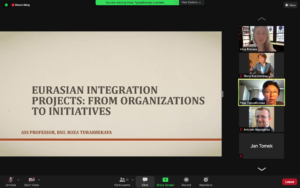 On 24 June 2021 the University of Kent team hosted WiPS webinar with Prof. Roza Turarbekava (Belarusian State University). Roza argued that digitalization of economy, education, health, security and defense systems have created new “easy” and “fast” forms of interaction and communication. Nation states, trying to adapt to these changes, are faced with new challenges: on the one hand, the continuation of integration processes, on the other hand, the inconsistency of the “heavy” and “slow” forms of international organizations with these changes. The Eurasian integration projects that have been proposed since 2000 (the Eurasian Economic Community, the Customs Union, the Common Economic Space, the Eurasian Economic Union) were partly an attempt to copy the forms of European integration. However, the absence of a core of values and the problem of the transition period from a planned economy to a market economy, as well as the difference in the strategy of political development, do not provide a solid basis for the creation of the Union. However, the social and political demand for the integration of the Eurasian space continues to persist. Therefore, taking into account the global dimension, which was mentioned above and the specifics of the regional dimension, initiatives such as the Eastern Partnership and the Belt and Road Initiative are becoming more attractive.
On 24 June 2021 the University of Kent team hosted WiPS webinar with Prof. Roza Turarbekava (Belarusian State University). Roza argued that digitalization of economy, education, health, security and defense systems have created new “easy” and “fast” forms of interaction and communication. Nation states, trying to adapt to these changes, are faced with new challenges: on the one hand, the continuation of integration processes, on the other hand, the inconsistency of the “heavy” and “slow” forms of international organizations with these changes. The Eurasian integration projects that have been proposed since 2000 (the Eurasian Economic Community, the Customs Union, the Common Economic Space, the Eurasian Economic Union) were partly an attempt to copy the forms of European integration. However, the absence of a core of values and the problem of the transition period from a planned economy to a market economy, as well as the difference in the strategy of political development, do not provide a solid basis for the creation of the Union. However, the social and political demand for the integration of the Eurasian space continues to persist. Therefore, taking into account the global dimension, which was mentioned above and the specifics of the regional dimension, initiatives such as the Eastern Partnership and the Belt and Road Initiative are becoming more attractive.
20 May 2021 – ‘The ‘good life’ as an alternative to neo-liberal governance: proposing a post-development approach to EU resilience governance in Central Asia’– Prof. Fabienne Bossuyt
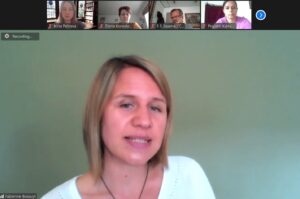 On 20 May 2021 the University of Kent team hosted WiPS webinar with Prof. Fabienne Bossuyt (Ghent University). Prof. Bossuyt presentsed her draft paper ‘The ‘good life’ as an alternative to neo-liberal governance: proposing a post-development approach to EU resilience governance in Central Asia’. Drawing on post-development thinking, the paper further advances the nascent scholarship that critically engages with the European Union (EU)’s approach to resilience as part of the EU’s external governance policy. Considering the limited effectiveness of the EU’s promotion of governance in its neighbourhood and further afield, the paper joins those scholars who argue in favour of a radical departure from the neo-liberal approach that the EU follows in its conceptualization and promotion of resilience in third countries. In the EU’s new Strategy for Central Asia, which was launched in May 2019, boosting the resilience of the Central Asian societies is singled out as a key priority. The paper argues that if the EU is serious about promoting resilience as a way to empower ‘the local’ and contribute towards a truly sustainable future for the societies of the Central Asian countries, then the EU will need to embrace a de-centered, post-neoliberal approach to resilience. This implies that the EU would have to accept ‘the other’ – in this case, the Central Asian societies – for what they are and advocate home-grown self-organisation predicated on a deep understanding of the local meaning of good life. Empirical illustrations to substantiate this claim are drawn from a concrete case, namely the Mahallas in Uzbekistan.
On 20 May 2021 the University of Kent team hosted WiPS webinar with Prof. Fabienne Bossuyt (Ghent University). Prof. Bossuyt presentsed her draft paper ‘The ‘good life’ as an alternative to neo-liberal governance: proposing a post-development approach to EU resilience governance in Central Asia’. Drawing on post-development thinking, the paper further advances the nascent scholarship that critically engages with the European Union (EU)’s approach to resilience as part of the EU’s external governance policy. Considering the limited effectiveness of the EU’s promotion of governance in its neighbourhood and further afield, the paper joins those scholars who argue in favour of a radical departure from the neo-liberal approach that the EU follows in its conceptualization and promotion of resilience in third countries. In the EU’s new Strategy for Central Asia, which was launched in May 2019, boosting the resilience of the Central Asian societies is singled out as a key priority. The paper argues that if the EU is serious about promoting resilience as a way to empower ‘the local’ and contribute towards a truly sustainable future for the societies of the Central Asian countries, then the EU will need to embrace a de-centered, post-neoliberal approach to resilience. This implies that the EU would have to accept ‘the other’ – in this case, the Central Asian societies – for what they are and advocate home-grown self-organisation predicated on a deep understanding of the local meaning of good life. Empirical illustrations to substantiate this claim are drawn from a concrete case, namely the Mahallas in Uzbekistan.
13 May 2021 – ‘The Dynamics of Reciprocity and Networks of the Kyrgyz through Toi-making: The Case of Bishkek’– Prof. Cholpon Turdalieva
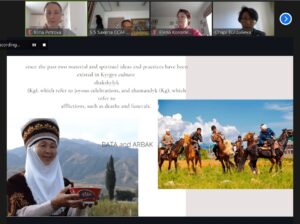 On 13 May 2021 the University of Kent held the WiPS session with Prof. Cholpon Turdalieva (American University of Central Asia, Kyrgyzstan) titled ‘The Dynamics of Reciprocity and Networks of the Kyrgyz through Toi-making: The Case of Bishkek’. Prof. Turdalieva argued that important life-cycle events in Kyrgyz society are marked by the staging of large informal feasting celebrations, known collectively as toi. Recognizing the broader social significance of such celebrations beyond the basic observance of life-cycle events, scholars have analyzed the ‘toi economy’ (Rubinov 2010) highlighting the importance of economic exchanges that occur around toi. Expanding Rubinov’s analysis of the toi economy, this seminar discussed continuity and change in the materiality and symbolism of toi making specifically in an urban context, in Bishkek the capital city of Kyrgyzstan. In this presentation Prof. Turdalieva analyzed toi making and factors that have influenced its evolution in the post-Soviet Bishkek and New York, which became a host for thousands of Kyrgyz emigrants and migrants. In order to show more particularities related to Kyrgyz toi in both cities, the seminar presented historical discussion alongside ethnographic interview case materials of a recent wedding celebration.
On 13 May 2021 the University of Kent held the WiPS session with Prof. Cholpon Turdalieva (American University of Central Asia, Kyrgyzstan) titled ‘The Dynamics of Reciprocity and Networks of the Kyrgyz through Toi-making: The Case of Bishkek’. Prof. Turdalieva argued that important life-cycle events in Kyrgyz society are marked by the staging of large informal feasting celebrations, known collectively as toi. Recognizing the broader social significance of such celebrations beyond the basic observance of life-cycle events, scholars have analyzed the ‘toi economy’ (Rubinov 2010) highlighting the importance of economic exchanges that occur around toi. Expanding Rubinov’s analysis of the toi economy, this seminar discussed continuity and change in the materiality and symbolism of toi making specifically in an urban context, in Bishkek the capital city of Kyrgyzstan. In this presentation Prof. Turdalieva analyzed toi making and factors that have influenced its evolution in the post-Soviet Bishkek and New York, which became a host for thousands of Kyrgyz emigrants and migrants. In order to show more particularities related to Kyrgyz toi in both cities, the seminar presented historical discussion alongside ethnographic interview case materials of a recent wedding celebration.
22 April 2021 – ‘Internal Aspects of Stability in Central Asia: Regional Integration and Disintegration’’– Dr Farrukh Salimov
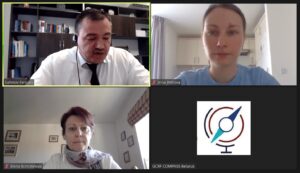 On 22 April 2021 the University of Kent held the WiPS session with Dr Farrukh Salimov (Tajik National University). Dr Salimov argued that Central Asia becomes one of the key sub-regions of Central Eurasia, actively participating in a number of international cooperation and integration projects. Regional stability remains one of the cornerstone factors for sustainable development of the region. This presentation addressed the factors of internal aspects of regional stability in Central Asia, with a particular focus on Tajikistan. It discussed some of the major trends in the local socio-economic development, and internal and external challenges to stability. Integration and disintegration processes, reasons behind them and potential risks were assessed. The presentation also highlighted potential scenarios for future of regional integration in view of wider regional stability of Central Asia. The recording will be available on the website shortly.
On 22 April 2021 the University of Kent held the WiPS session with Dr Farrukh Salimov (Tajik National University). Dr Salimov argued that Central Asia becomes one of the key sub-regions of Central Eurasia, actively participating in a number of international cooperation and integration projects. Regional stability remains one of the cornerstone factors for sustainable development of the region. This presentation addressed the factors of internal aspects of regional stability in Central Asia, with a particular focus on Tajikistan. It discussed some of the major trends in the local socio-economic development, and internal and external challenges to stability. Integration and disintegration processes, reasons behind them and potential risks were assessed. The presentation also highlighted potential scenarios for future of regional integration in view of wider regional stability of Central Asia. The recording will be available on the website shortly.
18 March 2021 – ‘The Nationhood through Neighbourhood? Post-coloniality and Emerging Features of Central Asian International Relations’ – Prof. Timur Dadabaev
 On 18 March 2021 the University of Kent held the WiPS session with Prof. Timur Dadabaev (University of Tsukuba, Japan). Prof. Dadabaev presented his ongoing research on post-coloniality in International Relations, particularly in the Central Asian region. By revisiting the main theoretical assumptions which are widely used to narrate the features of International Relations in Central Asia, the talk demonstrated that the major deficiency of theoretical frames applied to Central Asian (CA) region is that they extensively rely on rationalist arguments along the lines of rivalry, domination, spheres of influence, and the rhetoric of ‘divide and conquer’. This way they miss out the local dynamics of emerging CA regional international relations such as neighbourhood, brotherhood/fraternity and local norms that serve among distinctive features of international relations in Central Asia.
On 18 March 2021 the University of Kent held the WiPS session with Prof. Timur Dadabaev (University of Tsukuba, Japan). Prof. Dadabaev presented his ongoing research on post-coloniality in International Relations, particularly in the Central Asian region. By revisiting the main theoretical assumptions which are widely used to narrate the features of International Relations in Central Asia, the talk demonstrated that the major deficiency of theoretical frames applied to Central Asian (CA) region is that they extensively rely on rationalist arguments along the lines of rivalry, domination, spheres of influence, and the rhetoric of ‘divide and conquer’. This way they miss out the local dynamics of emerging CA regional international relations such as neighbourhood, brotherhood/fraternity and local norms that serve among distinctive features of international relations in Central Asia.
11 March 2021 – ‘Is There Room for More Engagement with Muslim Civil Society in Central Asia? Disaggregating Its Multipole Components, Approaches and Goals’ – Dr Emil Nasritdinov
 On 11 March 2021 the University of Kent held the WiPS session with Dr Emil Nasritdinov (American University of Central Asia, Kyrgyzstan). Dr Nasritdinov presented preliminary findings of the project on the role of Muslim civil society in Central Asia. He argued it is a growing unique form of civil society that appeals to civic engagement that is in harmony with Islamic values, and can therefore maintain conservative ideas such as gender-specific segregation, respect for the elderly, supremacy of the collective over the individual, and tradition over innovation. The presentation focused on six forms of Muslim civil society in four countries (Kyrgyzstan, Kazakhstan, Uzbekistan and Tajikistan): Muftiyats, Islamic Foundations, Islamic NGOs, various jamaats, mosques and mahallas. The research is co-authored by Dr Sebastien Peyrouse (George Washington University) and Dr Emil Nasritdinov (American University of Central Asia) and supported by the United State Institute for Peace.
On 11 March 2021 the University of Kent held the WiPS session with Dr Emil Nasritdinov (American University of Central Asia, Kyrgyzstan). Dr Nasritdinov presented preliminary findings of the project on the role of Muslim civil society in Central Asia. He argued it is a growing unique form of civil society that appeals to civic engagement that is in harmony with Islamic values, and can therefore maintain conservative ideas such as gender-specific segregation, respect for the elderly, supremacy of the collective over the individual, and tradition over innovation. The presentation focused on six forms of Muslim civil society in four countries (Kyrgyzstan, Kazakhstan, Uzbekistan and Tajikistan): Muftiyats, Islamic Foundations, Islamic NGOs, various jamaats, mosques and mahallas. The research is co-authored by Dr Sebastien Peyrouse (George Washington University) and Dr Emil Nasritdinov (American University of Central Asia) and supported by the United State Institute for Peace. 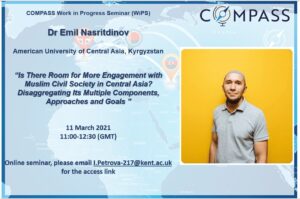
18 February 2021 – ‘COVID-19 and its impact on Azerbaijan: Is the system resilient enough?’’ – Dr Anar Valiyev
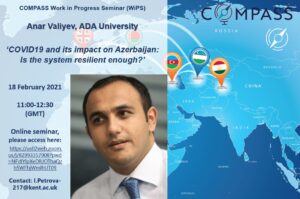 On 28 January 2021 the University of Kent held the WiPS session with Dr Anar Valiyev titled ‘COVID-19 and its impact on Azerbaijan: Is the system resilient enough?’. Anar argued that COVID-19 had significantly impacted many countries of post-Soviet Eurasia, affecting both political and economic realms. The echoes of it will continue to shape the future of these societies for a long period of time. Azerbaijan from this perspective is not an exception, suffering from the pandemic and paying price. All problems inherited by country previously, are expected to exacerbate within a few years, forcing government to start restructuring Azerbaijan’s economic system. The presentation examined possible impact of COVID-19 on political and economic situation in Azerbaijan, attempted to predict the future implications of the government’s actions on the system and offered a range of policy recommendations for greater resilience.
On 28 January 2021 the University of Kent held the WiPS session with Dr Anar Valiyev titled ‘COVID-19 and its impact on Azerbaijan: Is the system resilient enough?’. Anar argued that COVID-19 had significantly impacted many countries of post-Soviet Eurasia, affecting both political and economic realms. The echoes of it will continue to shape the future of these societies for a long period of time. Azerbaijan from this perspective is not an exception, suffering from the pandemic and paying price. All problems inherited by country previously, are expected to exacerbate within a few years, forcing government to start restructuring Azerbaijan’s economic system. The presentation examined possible impact of COVID-19 on political and economic situation in Azerbaijan, attempted to predict the future implications of the government’s actions on the system and offered a range of policy recommendations for greater resilience.
28 January 2021 – ‘Functions of the Uzbek community (mahalla) after independence’ – Dr Nodira Azimova
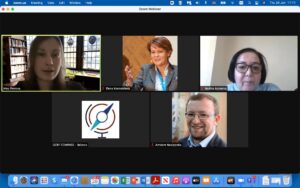 On 28 January 2021 the University of Kent held the first Work-in-Progress Seminar (WiPS) of the Spring term. Dr. Nodira Azimova from the Institute of History of the Academy of Sciences, Republic of Uzbekistan delivered a talk ‘Functions of the Uzbek community (mahalla) after independence’. Nodira argued that speaking of mahalla, many analysts often refer not to mahalla per se, but rather to its administration. This is because the term ‘mahalla’ means both – a community of people and the administration organisation of this community, mahalla committee. Mahalla as a community is a self-regulating living organism with a range of functions, which is much broader than the functions of a mahalla committee, although they may coincide to a degree. To illustrate this, Nodira discusses the interaction of a community and its administration taking the example of communal ceremonies. For instance, mahalla committee oversights the implementation of a range of standards regarding wedding ceremonies. However, the real regulator of a wedding cycle is the phenomenon of Orzu Khavas (dream). It shapes the perceptions of a community about an ideal wedding, including pre-wedding, wedding day and post-wedding stages, where the entire mahalla participates, whereas the mahalla committee only focuses on the formal wedding ceremony. Such analysis of micro-practices allows us to trace socio-cultural life of mahalla from a quantitative and qualitative perspectives through the understanding of the interaction of the community and its administration.
On 28 January 2021 the University of Kent held the first Work-in-Progress Seminar (WiPS) of the Spring term. Dr. Nodira Azimova from the Institute of History of the Academy of Sciences, Republic of Uzbekistan delivered a talk ‘Functions of the Uzbek community (mahalla) after independence’. Nodira argued that speaking of mahalla, many analysts often refer not to mahalla per se, but rather to its administration. This is because the term ‘mahalla’ means both – a community of people and the administration organisation of this community, mahalla committee. Mahalla as a community is a self-regulating living organism with a range of functions, which is much broader than the functions of a mahalla committee, although they may coincide to a degree. To illustrate this, Nodira discusses the interaction of a community and its administration taking the example of communal ceremonies. For instance, mahalla committee oversights the implementation of a range of standards regarding wedding ceremonies. However, the real regulator of a wedding cycle is the phenomenon of Orzu Khavas (dream). It shapes the perceptions of a community about an ideal wedding, including pre-wedding, wedding day and post-wedding stages, where the entire mahalla participates, whereas the mahalla committee only focuses on the formal wedding ceremony. Such analysis of micro-practices allows us to trace socio-cultural life of mahalla from a quantitative and qualitative perspectives through the understanding of the interaction of the community and its administration.
3 December 2020 – ‘Public Attitudes towards Scotland’s Constitutional Future in 1999-2011: Main Alternatives, Reasons for Support and Dynamics of Their Popularity’ – Ihar Kurs
On 3 December 2020 the University of Kent held the final Work-in-Progress Seminar (WiPS) of the Autumn term. Ihar Kurs, doctoral researcher from the Belarusian State University, presented his ongoing research “Public Attitudes towards Scotland’s Constitutional Future in 1999-2011: Main Alternatives, Reasons for Support and Dynamics of Their Popularity”. Ihar argued that since the beginning of the Scottish devolution and the resumption of the regional parliament in 1999, Scotland has entered into a new phase of political development. From then, the discussion about the potential constitutional status of the region centered around three main alternatives: independence of Scotland, preservation of the current arrangement introduced by the devolution, or a return to the position before 1999. Although the second option was the most popular, the levels of support for all of these alternatives were varying throughout the observed period. Among the factors that influenced this were the success of the current activities of local political forces that take alternative positions on the future of the region, the position of the central government in London and the general socioeconomic context. The talk examined the influence of each of these factors, the dynamics of support for various options for the future of the region up to the elections to the Scottish Parliament in 2011, and explained the motivation of the supporters of each option.
19 November 2020 – ‘Territorial Autonomy and Separatism: Ethnic Conflicts in the South Caucasus in the post-Soviet Period’ – Gunel Madadli
On 19 November 2020 the University of Kent held a Work-in-Progress Seminar (WiPS) with Gunel Madadli, a graduate student at ADA University in Azerbaijan. The discussion focused on Gunel’s doctoral proposal “Territorial Autonomy and Separatism: Ethnic Conflicts in the South Caucasus in the post-Soviet Period”. Gunel argued that the relationship between autonomy and separatist movements is a frequently discussed topic due to its significance in the self-management of minority groups. The aim of the presentation was to discuss the framework for analysis of whether territorial autonomy was a contributing factor to the violent ethnic conflicts and separatist movements in the South Caucasus. Considering several ethnic conflicts had demands for autonomy and some ethnic conflicts have been resolved by concession of autonomy, Gunel questioned whether territorial autonomy has become a strategy for defusing conflict.
12 November 2020 – ‘The school-to-work transition of young people in Azerbaijan: Is the state youth policy capable of providing needed support to ensure a smooth transition?’ – Abbas Babayev
On 12 November 2020 the University of Kent held a Work-in-Progress Seminar (WiPS) with Abbas Babayev, a graduate student of Public Administration (MPA) at ADA University in Azerbaijan. Abbas presented his master’s thesis “The school-to-work transition of young people in Azerbaijan: Is the state youth policy capable of providing needed support to ensure a smooth transition?”, which he successfully defended a day earlier. Despite the national Government’s recognition for its commitment to youth development, Azerbaijan is listed among the countries with the highest share of youth not in employment, education, or training (NEET youth). The NEET indicator is considered by international organizations to be a more comprehensive indicator of troubled youth transitions from school to work. An extensive exploratory analysis of primary sources collected in Azerbaijan in 2020 shows that while the legal and policy documents concerning Azerbaijan’s state youth policy envisage actions aimed at supporting youth in their school-to-work transition, their realization is significantly undermined by many impediments, including institutional constraints related to the management of the national youth sector as well as external impediments, which are not at the disposal of policymakers responsible for the youth sector.
8 October 2020 – ‘The agency of small states: The foreign policy of Belarus’– Paul Hansbury
Following a series of very insightful presentations and good discussions in 2019-2020, on 8 October our COMPASS project affiliate Dr Paul Hansbury presented his paper ‘The agency of small states: The foreign policy of Belarus’ at the first COMPASS WiPS of this new academic year. In the presentation Paul reflected how small states present a challenge from the perspective of International Relations theory, frequently attaining foreign policy goals against the wishes of great powers. He argued that disagreement among the policy elite within the small state in the early phase of foreign policy formulation translates into the attainment of goals (used as a proxy for agency) by granting the small state the flexibility to monitor and adapt its subsequent actions without provoking external powers. His presentation also used Belarus’s de facto policy of non-recognition in respect of Abkhazia and South Ossetia’s sovereignty after the 2008 Russo-Georgia War to illustrate its argument. He concluded with some thoughts on the implications of Belarus’s 2020 post-election situation – and the policy elite’s response – for the state’s agency in its international relations.
